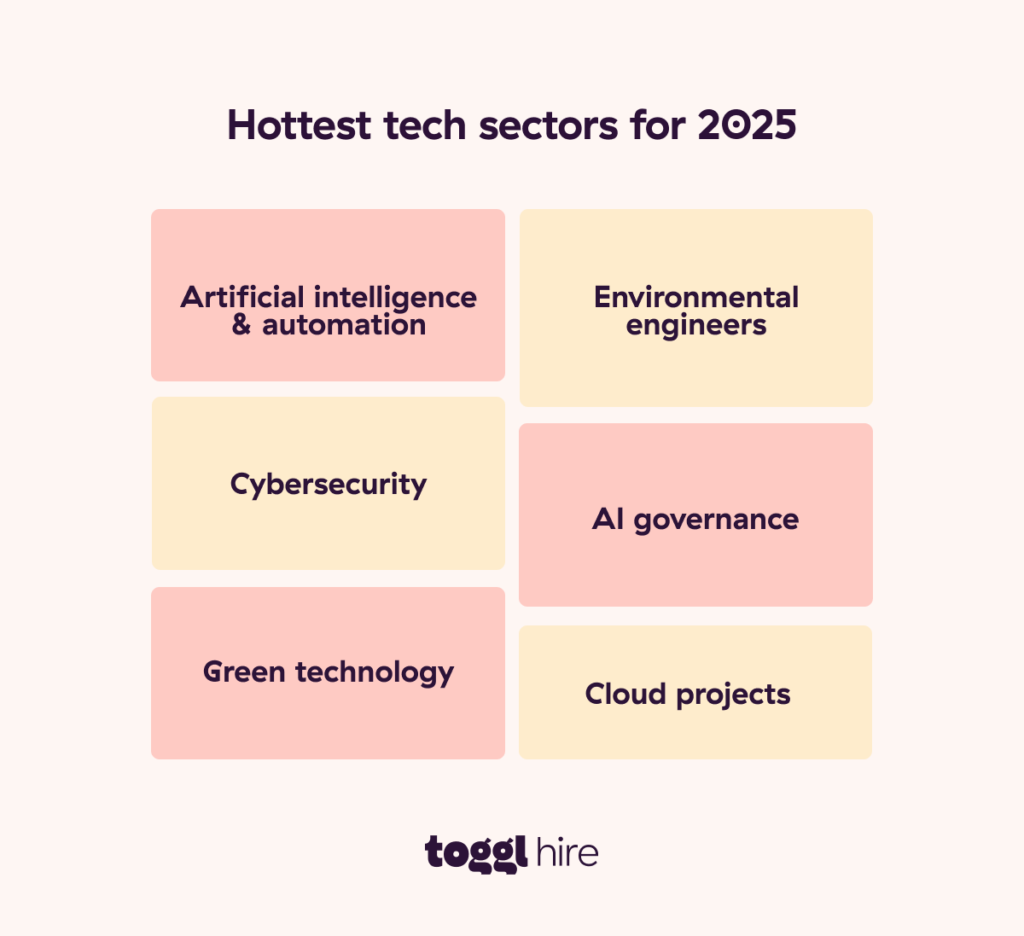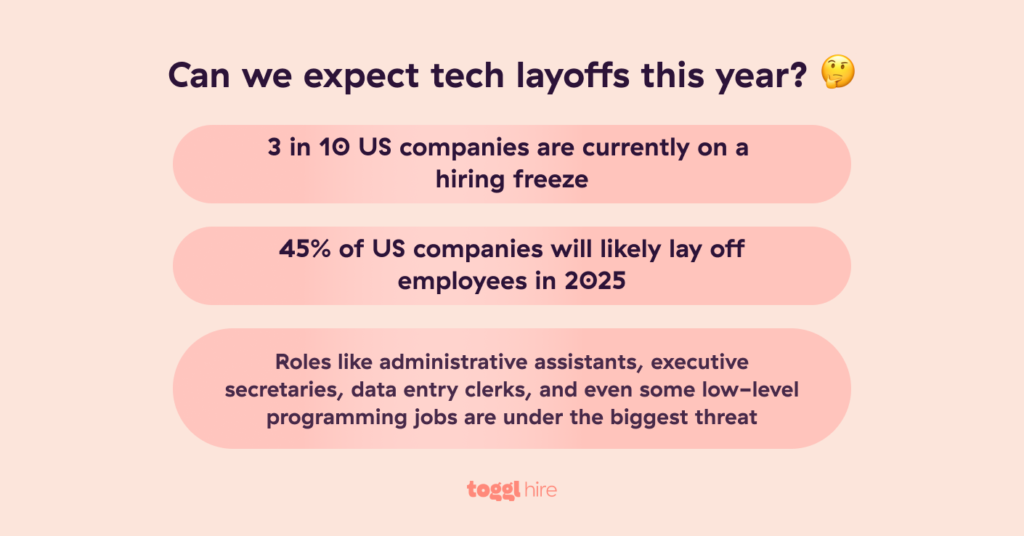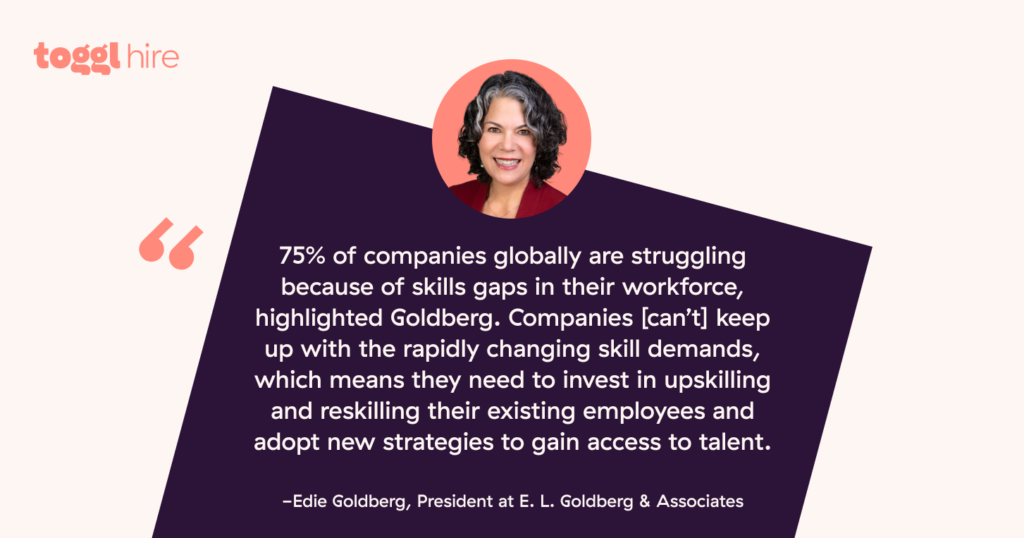39% of modern-day tech skills will be irrelevant by 2030. The tech industry is moving at break-neck speed, posing a challenge to hiring managers and growing companies who need to upskill their employees or change their candidate screening processes.
AI and automation are replacing jobs in some areas and creating opportunities in others. And the competition has never been stiffer — a global talent pool fuelled by remote work means thousands of applications per position is the new normal.
Whether you’re a job seeker navigating the seemingly never-ending job search, or an employer looking for the secret to cutting-edge hiring strategies, you’ll want to read on.
We dive deep into the latest reports, and present expert insights from hiring managers in tech to explore 2025’s job market in more detail.
TL;DR — Key Takeaways
- Hiring rebounds, but layoffs continue. 58% of tech leaders plan to hire, yet 45% of companies still anticipate layoffs in 2025.
- AI & cybersecurity dominate the market. Roles in AI, cybersecurity, green tech, and cloud computing are surging as automation reshapes industries and opportunities.
- Tension is growing between candidate expectations and employer offerings. Only 18% of new tech jobs will be fully remote, while nearly half of workers say they’d quit if forced back to the office.
- Analytical thinking tops the chart as the most in-demand soft skill of 2025. Adaptability, creativity, and problem-solving are now equally, if not more crucial, than technical expertise.
- Employers increasingly rely on skills assessments like Toggl Hire over traditional resumes to find top talent.
The current state of the tech job market
To understand what’s happening today, we have to rewind and look at the context of the last few years.
In 2021, the pandemic drove a huge surge in demand for tech professionals. 16 of 19 industries reported job openings were at an all-time high, creating a candidate-driven market with higher salaries and better benefits for tech workers.
But this didn’t last long. By 2022, mass layoffs made headlines as a staggering 263,000 people lost their jobs. Even big tech giants like Meta, Amazon, Microsoft, and Twitter let thousands of people go, spurned by rising inflation, and the advent of AI and automation.
This trend continued into 2024, with an estimated 95,000 tech layoffs. While companies slammed the breaks on recruitment, they took the time to formulate AI strategies and shift from a high-volume to a high-quality hiring approach. For example, the average technical interview score required to get an offer at a major enterprise or tech company rose 12% last year.
In 2025, the labor market is set to pick up again. According to the latest Robert Half data, 58% of tech leaders plan to hire for new full-time roles, though only 18% will be fully remote. This is in direct conflict with candidates’ interests. 46% of hybrid and remote workers would be unlikely to stay in their jobs if their position suddenly required them to return to the office full-time.
Outside of the remote vs. hybrid vs. in-person debate, 2025 will see the resurgence of certain sectors, such as:
- Artificial intelligence & automation
- Cybersecurity
- Green technology
- Environmental engineers
- AI governance
- Cloud projects

Most of these areas are driven by advancements in tech, AI, robotics, and automation, which are set to transform the industry landscape. Edie Goldberg, President at E. L. Goldberg & Associates and future of work expert, shared her thoughts with us:
“These technologies will be responsible for significant shifts in terms of job loss in fields like insurance, healthcare, and professional services, while also driving growth in new roles in technology, healthcare, and advanced manufacturing. Climate change drives demand for roles in renewable energy and environmental engineering,” she says.
It’s no surprise that AI proficiency tops the list as one of the most sought-after hard skills in 2025. Other desirable skills include data science, IT operations, cybersecurity, and process automation. Companies want to do more with less — anyone who helps them reach that goal is invaluable.
Can we expect any major tech layoffs in 2025?
Unfortunately, we’re not out of the woods yet. The tech sector has already announced layoffs in early 2025 — Meta has recently culled its workforce by 5%, or about 3,600 employees. Stripe will also let go of 300 employees, despite planning to grow its overall headcount by 17%.
One report found that 3 in 10 US companies are currently on a hiring freeze and that 45% will likely lay off employees in 2025.
On the flip side, the Robert Half report we mentioned earlier predicts over half of companies will hire in 2025.
So, what could be behind the seeming contradiction? It seems AI & automation is a double-edged sword — it leads to workforce reductions in some roles while creating opportunities in others.
Namely, AI and automation will replace low performers and routine, repetitive jobs. Roles like administrative assistants, executive secretaries, data entry clerks, and even some low-level programming jobs are under the biggest threat of lay-offs.
Demand is also growing for tech and AI specialists, especially in AI, cybersecurity, and data science, to implement and optimize these newer systems. This will fuel the growth of roles like:
- Big data specialists
- Fintech engineers
- AI and machine learning specialists
- Software and application developers
- Autonomous and electric vehicle specialists
- Environmental engineers
- Renewable energy engineers

The hottest tech roles companies are hiring for in 2025
“Data scientists, ML engineers, and AI architects — all of these roles will be super hot in the next few years,” says Pavlo Tkhir, CTO at Euristiq. “On top of that, with AI comes responsibility connected to data privacy. AI uses a lot of data and is prone to security threats. Therefore, cybersecurity professionals will also be in high demand.”
Let’s look at what some of these roles entail, how much they’re paid, and their predicted job growth over the next few years.
AI engineers
AI engineers develop and implement AI models and algorithms to solve complex problems, enhancing system capabilities across various industries.
Required skills: Proficiency in programming languages such as Python and R, strong understanding of machine learning frameworks, data analysis, and problem-solving abilities.
Salary expectations: $101,752 per year (on average).
Predicted demand growth: The U.S. Bureau of Labor Statistics predicts 26% growth from 2023 to 2033.
Cybersecurity experts
Cybersecurity engineers design and implement security measures to protect systems and data from cyber threats and remain compliant with international security standards.
Required skills: Knowledge of network security, encryption, cryptography, risk assessment, familiarity with security frameworks, and proficiency in certain programming languages and security tools.
Salary expectations: $122,890 per year (on average)
Predicted demand growth: +33% from 2023 to 2033.
Data scientist
Data scientists analyze large datasets to extract insights, develop predictive models, and inform strategic decision-making within organizations.
Required skills: Expertise in statistical analysis, proficiency in programming languages like Python or R, experience with data visualization tools, and strong analytical thinking.
Salary expectations: $122,738 per year (on average)
Predicted demand growth: +36% from 2023-2033.
Green tech developers
Green tech developers design and implement software that promotes environmental and energetic sustainability.
Required skills: Programming languages such as Python, Java, or C++, knowledge of sustainable design principles like life cycle assessment and circular economy, and awareness of environmental laws and standards.
Salary expectations: $129,348 per year (average for a standard programmer)
Predicted demand growth: 18.7% (CAGR) from 2024 to 2029

What are tech companies prioritizing when hiring?
As the tech job market evolves, companies are rethinking their hiring strategies to find and retain top talent. From prioritizing soft skills to embracing AI literacy, here’s what’s shaping tech recruitment in 2025.
Soft skills are increasingly important for tech talent
Too often brushed aside in favor of glitzy hard skills and tech-speak, soft skills are no longer a nice-to-have. They’re essential for navigating complex tech projects that rely on teamwork and cross-functional operations.
“Analytical thinking remains the most in-demand skill, with 7 out of 10 companies considering it essential,” says Goldberg. CEO of PhoneBurner, Chris Sorensen, confirms this:
“The demand for soft skills like adaptability and problem-solving has seen increased emphasis from employers like us. As tech evolves, hiring managers are prioritizing candidates who can learn and adapt quickly rather than solely relying on current expertise.”
Other increasingly important skills include creativity, resilience, flexibility, and agency — as highlighted by Dovilė Gelčinskaitė, Senior Talent Manager at Omnisend:
“Companies are starting to expect, not just appreciate, high agency in candidates. Hiring managers may prefer proactive people who figure things out without waiting for step-by-step instructions. For example, engineers who are comfortable with unfamiliar tech and pick it up quickly over those who would go for rigid frameworks.”
Skills tests will become more prominent in tech hiring processes
According to Goldberg, 62% of the eligible US workforce does not have a college degree. “We simply can’t leave out people who cannot afford college,” she says. Instead, she advocates a skills-first talent strategy focusing on certified skills in one step.
That’s exactly why we created Toggl Hire — to help busy hiring managers screen candidates in record time and shortlist the cream of the crop in just a few taps. It also ensures fairer hiring based on actual performance rather than a good-looking resume.
“We incorporate a skills test as a first step for all of our roles,” shares Marie Pilz, a member of the PeopleOps team at Toggl. “It is extremely helpful as a hiring manager, as it reduces the time it takes to screen candidates by at least half, and candidates enjoy the experience much more.”
“Users tell us this is beneficial when hiring for tech roles,” Pilz adds, “especially in smaller companies where the CEO or hiring manager might not have years of experience in the role. The skills tests provide them with a great starting base for assessing candidates’ on-the-job skills.”
Everybody should know the basics of AI by now
“People in both tech and non-tech roles are now expected to work with AI tools to enhance overall efficiency,” emphasized Gelčinskaitė.
As industries across the board increasingly rely on AI skills, the need for literacy on deeper issues like machine learning bias and the ethics of AI will only grow. Employees should upskill and adapt to ensure responsible, bias-free AI implementation.
Industries like healthcare, finance, and insurance are most susceptible to privacy and sensitive data leaks when handling data like medical records or bank details. We will only be as unbiased as our weakest algorithm — it’s our duty to uphold the most objective development possible.

Tech companies are prioritizing upskilling and re-skilling
The World Economic Forum declared that 39% of workers’ existing skill sets will be transformed or become outdated between 2025 and 2030. While that might seem like a lot, it’s actually down from 57% in 2020 and 44% in 2023.
Rapid advancements in AI, cloud computing, and cybersecurity are the driving forces behind this. Even though the gap appears to be closing, it still poses a real challenge for businesses.
75% of companies globally are struggling because of skills gaps in their workforce, highlighted Goldberg.
“Companies [can’t] keep up with the rapidly changing skill demands, which means they need to invest in upskilling and reskilling their existing employees and adopt new strategies to gain access to talent,“ she continued.
Beyond just hard skills, there’s a need for what Gelčinskaitė calls T-shaped talent.
“Deep expertise in one area is no longer enough for professionals,” she says. “It’s equally as important to have broader, cross-disciplinary knowledge to bridge gaps between technical execution and client needs. For example, developers who also understand UX and maybe even product strategy.”
Tech hiring managers need to move fast to snag top talent
“Hiring itself will be largely automized,” says Tkhir, CTO at Euristiq. “AI can take over the initial stage of hiring by going through applications and filtering them, leaving only those candidates who fit the criteria. And it can do it really fast.”
Speed is critical when you consider that top candidates are juggling multiple offers and could be off the market within days. Here’s the outline of the hiring process that allowed us to hire 200+ people from 40+ countries over the last 10 years here at Toggl:
- Use an automated skill-testing tool like Toggl Hire to shortlist your qualified candidates.
- Create standardized evaluations using our Homework feature
- Invite stand-out performers to a structured culture interview with the team
- Invite your last 2-5 candidates to a paid test week to get to know the team and decide if your organization is a good fit for them.
This system allows you to act quickly without sacrificing quality. Don’t take our word for it, see how our process cut Monese’s time to hire by 86%.
Publishing job listings globally will attract even better candidates
Expanding your talent searches beyond conventional waters can build a better, more diverse, and more resilient team. With the rise of remote work, you have access to specific skill sets your organization might need.
Chris Sorensen, CEO of PhoneBurner, has a unique approach to this: “We bring on employees who are open to project-based and contract work. For us, it has allowed our team to bring in specialized talent for extremely niche initiatives without the longer-term commitments.”
While this approach makes the global talent more approachable (contractors generally carry less bureaucratic red tape), this tactic isn’t without its growing pains. “It demands a more deliberate effort to integrate these individuals into our workflows,” he admits.
Sometimes, you don’t have to search stranger’s shores for a missing skill set. It might be hidden in under-utilized talent pools.
“HR professionals and leaders need to understand the value of employing people with disabilities, military veterans, people who have been previously incarcerated, and older workers. We have to leave no stone unturned to find talent that will work hard and continuously learn as the world around us rapidly changes,” Goldberg reminds us.

Hire better tech talent faster with Toggl Hire
The tech job market in 2025 is set to be less turbulent than in previous years. With the demand for AI, automation, and cybersecurity still going strong, these skills remain super relevant. But entry-level software engineer jobs easily replaceable by AI, and roles in other areas, remain at risk of lay-offs.
Both tech candidates and hiring managers must undergo significant upskilling over the next five years to remain relevant, mainly assimilating AI into their workflows. Both will benefit from checking out Toggl Hire.
Toggl Hire helps companies build efficient hiring processes in a competitive tech job market. Case in point: Proxify used our platform to hire over 100 software developers 150% faster, with 93% predictive accuracy before they even got on a pre-screen call.
Toggl Hire also offers job seekers the chance to highlight their skills, making them more attractive to potential employers.
Ready to elevate your hiring process and remain relevant in 2025? Sign up for free today, or book a demo to get a personalized introduction to how Toggl Hire can help you hire the tech talent you need to scale your business.
Julia Masselos is a remote work expert and digital nomad with 5 years experience as a B2B SaaS writer. She holds two science degrees Edinburgh and Newcastle universities, and loves writing about STEM, productivity, and the future of work. When she's not working, you'll find her out with friends, solo in nature, or hanging out in a coffee shop.






